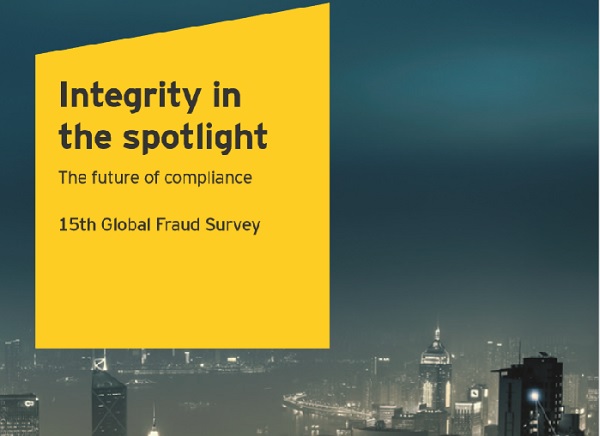
EY has just published a report including the results of its 15th Global Fraud Survey which involved 2,550 executives responding from 55 countries, including Luxembourg.
Changing regulation, increased enforcement and the adoption of new technologies are changing the risk landscapes that organisations must face; the survey respondents see fraud and corruption among the greatest risks to their business and our results show there remains a significant level of unethical conduct.
No reduction in fraud and corruption
The survey found that although there were some improvements in certain countries, fraud and corruption have not declined globally in the last two years. Although fraud and corruption remain more prevalent in emerging markets, a significant minority of respondents reported widespread corruption in developed markets.
According to the survey results, younger respondents are more likely to justify fraud or corruption to meet financial targets or help a business survive an economic downturn. With increased pressure for individuals and businesses to succeed, the problems of fraud and corruption do not appear to be going away.
The impact of enforcement
The last two years have seen an unprecedented level of fines from governments, with dramatically increased penalties being imposed by Brazil, the Netherlands, the UK and Switzerland, among others. More governments across the world are seen to be introducing and enforcing anti-corruption laws. However, the global results show that occurrences of fraud and corruption have not reduced since 2014. From EY's experience, there is often a lag between the introduction of laws and real change being made by organisations.
Announced intentions vs. performance
The majority of respondents stated that management has introduced anti-corruption policies, whistleblowing hotlines and statements of ethics. However, the report results do not see a corresponding decrease in unethical conduct and business failures. Organisations should focus their efforts on improving the effectiveness of these programmes by assessing the corporate culture, controls and governance from an integrity perspective, leveraging new technologies to provide better data insights.
It is the respondents’ perception that the benefits of acting with integrity include improved customer and public perception and successful business performance, while the cost of non-compliance with laws continues to increase. So why do we still see unethical conduct? One reason may be that it is not clear who within an organisation is responsible for integrity. Fewer than one in four of respondents believe it is primarily an individual’s responsibility. Businesses should set a clear expectation of their employees and third parties as to their responsibility for integrity.
The future of compliance
With the introduction of digital compliance tools such as predictive analytics and real-time risk alerts, forensic data analytics (FDA) can significantly improve the effectiveness and efficiency of monitoring and reporting, strengthening the second line of defence.
Compliance has a role in the first line of defence. It is important that compliance professionals embed themselves within the operational and strategic parts of business, sharing insight and promoting a culture of integrity.
Luxembourg
The highlight of the Luxembourg part of the study: despite the importance of the financial sector, two-thirds of the respondents represent non-financial companies, which allows a real assessment of the specificities of Luxembourg in all relevant economic sectors.
Gérard Zolt, EY Luxembourg's Fraud Investigation & Dispute Services Leader, commented "Insufficient improvements in the levels of corruption over the past six years show how unethical business-related behaviour remains a challenge for the world despite the worldwide strengthening of dedicated measures. At present, corruption remains widespread. Companies are therefore vulnerable and likely to suffer significant damage, whether financial or reputational. Management teams must identify and address the root causes of unethical behaviour within their organisation. Compliance programmes must keep pace with technological developments and those related to the increasing complexity of the regulatory environment, to take into account their impact on business conduct. More robust risk management should be seen as a strategic measure to improve business performance."
Regions where the risk of corruption is higher than the average despite stronger anti-corruption regulations and their implementation in a number of countries include: Central and Eastern Europe (47%), the Middle East (62%) and Latin America (74%).
Gérard Zolt concluded "The crucial challenge for Management and the Board of Directors is to build a strong culture that promotes integrity and compliance in which employees demonstrate good behaviour because it is the right thing to practice and not just because the code of conduct advocates it. 6% of respondents in Luxembourg admit to having suffered significant fraud in the last two years, which places Luxembourg at the same level as France, Switzerland and the United States. Encouragingly, advances in data analytics are enabling companies to leverage new technologies to make their efforts pay more as they strive to improve the results of their investigations and compliance".








